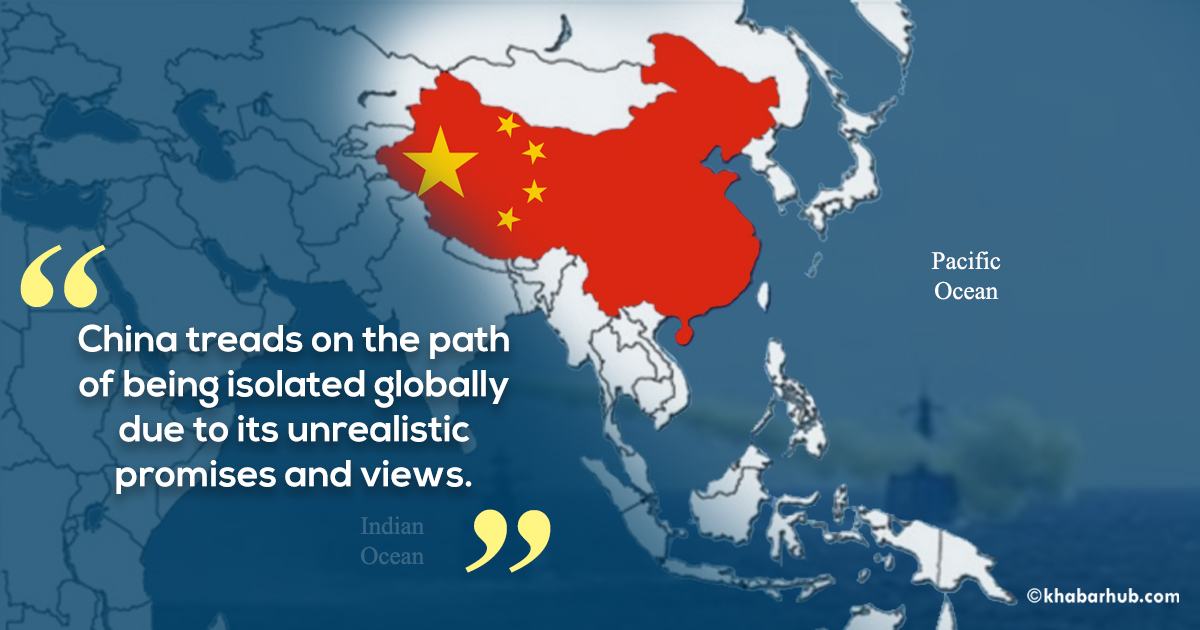KATHMANDU: Attempting to seek geopolitical or strategic gains through intimidation, pressure tactics, militarization, and exploiting crisis, China treads on the path of being isolated globally due to its unrealistic promises and views.
Moreover, due to China’s suspected role in the global COVID-19 pandemic, it stands cornered today.
A backlash is building against the communist state for its initial mishandling of the COVID-19 crisis, which helped lose the pandemic on the world.
Despite attempting to place itself as a prospective messiah for the years to come, the Chinese way of exploiting the COVID-19 crisis along with the woes and sufferings of others for geopolitical gain is isolating the communist country from the international community.
Moreover, China’s refusal to let the independent investigation into pandemic’s origins, assertive behavior against its neighbors– from the South China Sea to India — and intolerance to the essence of democratic norms and values, and the attempt to uproot these values from the area under its control as in case of Hong Kong, its decision to pass security law as a means to sweeping powers to crush dissent all indicate the arrogance, intolerance and disregard of the human values are some of the traits of the Chinese regime.
Enticing the poor countries to be part of its most ambitious strategic plans and making them subject to debt trap so as to retain communist regimes hold on them for much longer is another phenomenon of the Chinese regime.
One of the glaring recent examples is the attack at the Line of Actual Control (LAC) in Ladakh’s Galwan Valley killing 20 Indian soldiers in June 2020. An angered reacted alleging China of breaking an agreement to respect the LAC.
Besides, lack of transparency and the state-sponsored theft of intellectual property, disinformation campaigns against those who stick to democratic values and gross violence of human rights have also become the characteristics of the present-day Chinese regime.
Enticing the poor countries to be part of its most ambitious strategic plans and making them subject to debt trap so as to retain communist regimes hold on them for much longer is another phenomenon of the Chinese regime.
Not to forget the imperialistic traps stretched in the neighborhood like Sri Lanka and Pakistan, and the pressure tactics against Malaysia, the Philippines and Vietnam show the extreme measures China can adhere to accomplish its ambitious goals.
China, in fact, seems to be heading toward coercion against almost all of its neighbors, intimidation campaign against Taiwan, attempt to uproot democratic values in Hong Kong in the name of implementing national security law which is a glaring example that Beijing is also antagonistic to all principles and values which put humanity at the center.
Unlike in previous instances when the Chinese aggressive spying was termed as US’s sharp and quick responses, other power nations have also realized the threat China’s spying on others through its expansion of the technology market.
Despite presenting itself as a promising rising power aiming to rule globally, China’s indifference towards the fundamentals of human rights is not only unacceptable, the suppression of rights is horrible in China.
Beijing’s atrocity over a million Uighur Muslim minorities in their native land is almost indescribable. The Uighur community is not only incarcerated, but there are mass forced sterilization and gross human rights abuse to other minority groups as well.
A shrinking economy, withering influence denotes the collapsing Xi policy
Besides the coronavirus pandemic, several other factors have also turned repulsive to the Chinese economy.
One among them is the haphazard development works carried out that has put the country in further difficulties. It has witnessed the worst flood-hit, landslides and overflowing rivers washing away thousands of hectares of cultivable farms jeopardizing the economy.
It should also be noted that several large swaths of central and eastern China have destroyed thousands of houses and millions of displaces further battering the shrunk economy.
It becomes evident that both the internal and external factors have contributed to the collapsing Chinese economy and withering strength. The inefficient response in the spread of first waves of COVID-19 responses, the intolerance towards its religious minorities like Uighur, the suppression of the voices seeking justice, and human rights all indicate that Xi’s eulogy is going to be over soon.
Besides, China’s unwillingness to let the international community visit the coronavirus pandemic and Xi’s declaration of victory over the COVID but the unwillingness to acknowledge wrong handling and global spreading of the pandemic has made the global community more skeptic towards China.
Recent responses denoting the isolation of China
Consider what US Secretary of State Mike Pompeo had to say: “China ripped off our prized intellectual property and trade secrets, causing millions of jobs all across America, sucked supply chains away from America, and then added a widget made of slave labor.”
In his speech delivered at the Nixon institute, he pointed out that China has made the world’s key waterways less safe for international commerce posing threats everywhere.
Unlike in previous instances when the Chinese aggressive spying was termed as US’s sharp and quick responses, other power nations have also realized the threat China’s spying on others through its expansion of the technology market.
Recently, the UK banned Huawei from 5G networks, the latest example of growing pressure on Chinese government-backed Huawei on espionage concerns — believed to make security holes in their system for China’s government spying purposes.
Huawei, in recent times, has been facing charges of bank fraud, money laundering, stealing trade secrets, and violating sanctions in several European countries and the USA.
Thirty-plus countries and territories have made themselves 5G “Clean Countries,” banning untrusted vendors from their networks.
When the EU and Japan have condemned China’s national security law targeting Hong Kong, ASEAN nations have also concluded that Chinese intolerant and friendly behavior has been scaling tensions in the South China Sea.
Earlier there used to be just a few countries doing so. Canada has stood firmly against the Chinese Communist Party’s hostage-taking.
Not only this, but it has also banned ‘untrusted’ vendors from China and has banned three major telecom carriers.
In contrast to the previous trend, not only the power nations like the USA and UK, small countries like Belize and Haiti have also denounced Beijing’s national security law targeting Hong Kong.
When Denmark has rejected the CCP’s attempted censorship of Danish newspapers, Sweden has closed its Confucius Institutes.
For the first time in their history, Lithuanian intelligence services have identified China as a potential threat.
Australia has denounced Chinese imperialistic grips and has declared China’s South China Sea claims unlawful, illegitimate, and therefore, unacceptable.
When the EU and Japan have condemned China’s national security law targeting Hong Kong, ASEAN nations have also concluded that Chinese intolerant and friendly behavior has been scaling tensions in the South China Sea.
Hence, all 10 ASEAN nations have insisted that the South China Sea disputes must be settled on the basis of international laws, including UNLOS. A trade partner and the neighboring country India has banned 106 Chinese applications citing that they threatened its citizens’ privacy and security.









Comment